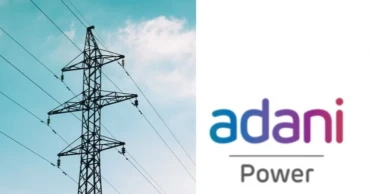Adani Power Plant
Transmission from Adani’s Gadda power plant to national grid resumes
Transmission from Adani’s Gadda Power Plant, in the Indian state of Jharkhand, to Bangladesh's national grid resumed at 3:43 am (early hour) on Thursday (June 8, 2023).
According to official sources, the transmission line from Godda power plant tripped at 2:46 pm on Wednesday (June 7, 2023), worsening the already severe load shedding situation across the country.
According to officials of the Power Grid Company of Bangladesh (PGCB), the operation of the Godda power plant was first resumed at 11 pm on Wednesday night through sending auxiliary power from Bangladesh, and then after a series of technical checks in the system, power transmission to Bangladesh's national grid resumed.
Read more: Adani's Godda plant commissioned with issues over coal tariff unresolved
“Power supply from Adani's (Godda) plant became normal at 3:43 am on Thursday,” Badruddoza Sumon, spokesman of PGCB, told UNB.
India's Adani Group set up the 1,600 MW capacity coal-fired power plant at Godda to exclusively supply electricity to Bangladesh. Its 800 MW unit started commercial operation in March while the second unit is now on test run -- generating 50-100 MW every day.
Read more: Adani Power starts commercial electricity supply to Bangladesh keeping tariff issue unsettled
Meanwhile, officials of Bangladesh Power Development Board (BPDB) said that excessive load shedding across the country continues with lower power supply.
The official data from National Load Dispatch Centre shows that the country experienced a load shedding of 2961 MW at 1 am, 2976 MW at 2 am, 2939 MW at 3 am, 2819 MW at 4 pm, 2606 MW at 5 am, and 2463 MW at 6 am when power supply was between 11,700 MW and 11,300 MW against demand between 14,800 MW and 13,900 MW.
Read more: Test transmission of power supply from Adani plant to Bangladesh's national grid starts
BPDB officials said there is a projection that the country’s highest demand will be 15,200 while the highest generation will be 12,200, leaving a shortage of nearly 3000 MW.
It is a widespread allegation that people in rural areas have to experience much more frequent power cuts than in urban areas, especially in the capital Dhaka and other major cities. People living in some rural areas say they experience load shedding for over 12 hours a day.
Read more: The Tk 700 crore per month hole in the deal with Adani Power
2 years ago
Amid standoff over tariff, transmission lines for electricity from Adani plant completed
The 104 km Bogra (West) to Rohanpur 400 kV grid transmission line and substation is ready to carry electricity from Adani Power's 1,600 MW thermal power plant in Godda district of Indian state of Jharkhand, although the issue of revising the tariff structure, that the government of Bangladesh is belatedly pursuing, is not settled yet with the Indian company.
“Our transmission line and associated substations are ready for operation. We’ve been conducting some test runs of the installations,” said Md. Alamgir Hossain, the project director of the Southwest Transmission Grid Expansion Project.
According to official sources, the Power Grid Company of Bangladesh (PGCB) has been implementing the project with the financial support of the Asian Development Bank (ADB) at a total cost of Tk 3273.78 crore. The Bangladesh government and PGCB are also financing the project.
Read More: Why we take power from India’s Adani Group at higher prices, questions MP Chunnu
The electricity from Adani Group will enter Bangladesh through a 26 km line from Bangladesh border to Rohanpur and then it will come to Bogura grid substation.
Recently, dismissing any uncertainty over the Adani power’s availability to Bangladesh national grid, State Minister for Power, Energy and Mineral Resources Nasrul Hamid said the electricity from the Jharkhand power plant will be added to the national grid in March as per the agreement.
As per the report, Adani Power recently sent a request for BPDB to issue the demand note, where the coal price is quoted at $400 per metric ton - far above what BPDB officials believe it should be given the present state of the international market.
Read More: Adani Power team likely to visit Bangladesh to discuss coal price, power tariff
A highly placed source at the BPDB said that the organisation sent a letter date January 23 referring to State Minister-led delegation’s recent visit to the Adani plant mentioned, “During the discussion your side also opined that suitable mechanism will be devised to reduce this inconsistency of coal price by adjusting/changing the coal pricing mechanism of the power purchase agreement (PPA)”.
Nasrul Hamid said the tariff of Adani's power will be competitive compared with other coal-fired plants like Payra power plant.
However, official sources said BPDB is yet to receive any official reply from the Adani Group on its request for revising the power tariff through “adjusting/changing the coal pricing mechanism of the power purchase agreement (PPA)”.
Read More: BPDB seeks revised agreement with Adani before importing power from Jharkhand plant
“A representative has informed us that a high level team will visit Bangladesh soon to discuss the coal price and power tariff issue,” he told UNB on condition of anonymity.
Since practically all the power generated by the plant located in the Godda district of Jharkhand state will be exported to Bangladesh, Adani Power requires a demand note from BPDB that it can present to Indian authorities before opening LCs against the coal import.
Adani Power recently sent a request for BPDB to issue the demand note, where the coal price is quoted at $400 per ton -- far above what BPDB officials believe it should be given the present state of the international market.
Read More: The Tk 700 crore per month hole in the deal with Adani Power
“In our view, the coal price they have quoted ($400/MT) is excessive - it should be less than $250/MT, which is what we are paying for the imported coal at our other thermal power plants," the BPDB official said.
A number of BPDB officials told UNB the Adani’s power tariff might be between Tk 20-22 per kilowatt hour (each unit) because of the absence of a provision for discounts on the purchase of coal in the PPA signed with Adani Power, that allowed the Indian firm to quote such a steep bill for the coal.
The absence of such a provision is all the more notable since it was made mandatory in the PPAs for thermal power plants signed with other independent power producers, domestic or foreign. In these PPAs, the price of coal to be purchased as primary fuel was kept as “pass-through”.
Read More: Adani’s 750 MW power to come to national grid in March: Nasrul Hamid
Officials said that they have been working on a number of alternatives to offer Adani so that its coal price could be reduced to ultimately lower the power tariff.
"If Adani's power tariff is not competitive, it would be difficult for BPDB to keep it on the merit list to take its electricity for the national grid,” said another top BPDB official.
3 years ago



